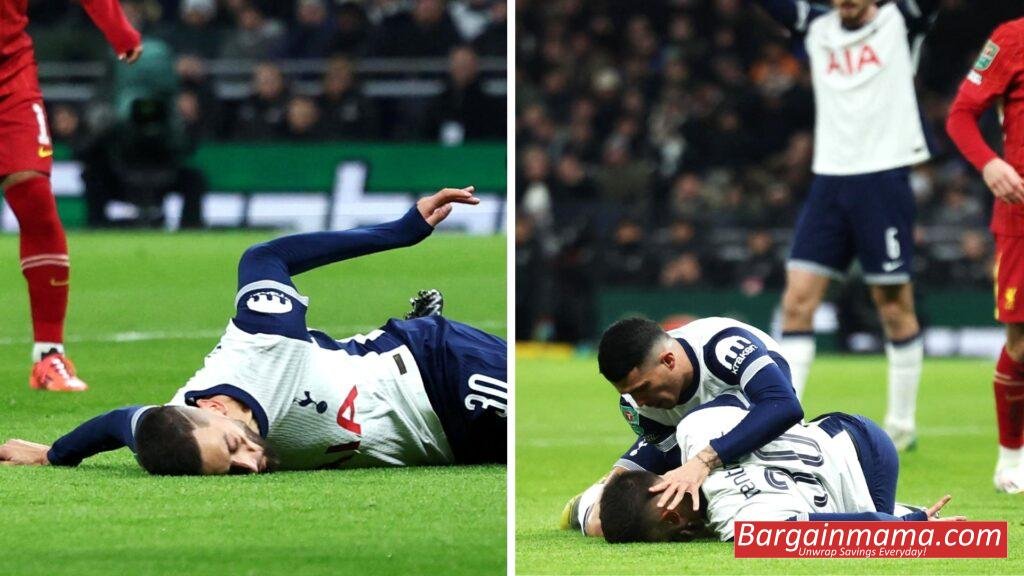Tottenham Hotspur midfielder Rodrigo Bentancur shocked fans when he suddenly collapsed during a match against Liverpool, just five minutes into the game. The 27-year-old attempted a header but fell awkwardly, landing face down and motionless on the pitch. While Bentancur later shared a reassuring photo from his hospital bed with his fiancée, Melany La Banca, the exact reason for his collapse remains unclear.
This incident has sparked discussions about potential medical causes behind such sudden events in seemingly healthy athletes, a phenomenon that has been observed in other high-profile cases.
Cardiac Conditions in Athletes: A Common Culprit
Sudden collapses on the field are often linked to heart-related issues, many of which can go undiagnosed until triggered by physical exertion. Several recent cases highlight this risk:
- Juan Izquierdo, 27, tragically died in August due to cardiac arrhythmia caused by a viral infection that overstrained his heart.
- Tom Lockyer, 30, suffered a collapse last year due to atrial fibrillation, a condition causing irregular and abnormally fast heartbeats that can lead to heart attacks.
- Christian Eriksen, 32, collapsed in 2020 due to ventricular fibrillation, a condition that disrupts the heart’s ability to pump blood effectively.
These cases demonstrate the vulnerability of athletes to undetected heart conditions, even at the peak of physical fitness.

High-Intensity Sports and Heart Strain
Football is classified as a “stop-and-go” sport, characterized by intense bursts of activity followed by brief periods of rest. These abrupt changes in exertion place significant strain on the heart, which can exacerbate any underlying cardiac issues. Studies show that athletes in such sports face a higher risk of cardiac events compared to those in endurance-based activities.
Other Potential Causes of Collapses
While heart-related conditions are often the primary concern, other factors may also contribute to sudden collapses in athletes:
- Commotio Cordis:
- A rare condition caused by a high-speed impact to the chest, disrupting the heart’s electrical signals. Though uncommon, it is a recognized risk in sports involving physical contact.
- Dehydration:
- Inadequate hydration can lower blood pressure, causing dizziness or fainting. According to the British Heart Foundation, dehydration thickens the blood, increasing the risk of clots and heart complications.
- Heat Stress:
- Playing in extreme heat without sufficient cooling can lead to heat exhaustion or heat stroke, potentially causing disorientation and collapse.
The Importance of Athlete Screening
Although medical screenings are standard for professional athletes, they are not foolproof. In the UK, footballers undergo mandatory heart checks at 16, but follow-ups are only recommended, not mandatory. Cardiologists like Professor Guido Pieles, who leads the Sports Cardiology Clinic, emphasize the need for regular screenings as athletes age, as some heart conditions may develop later in life.
“If a player is screened at 16, we cannot guarantee that by the time they are 29, everything is still normal,” Professor Pieles noted. Longitudinal screenings could help detect heart issues that emerge over time, providing critical early intervention.
A Call for Enhanced Player Safety
Rodrigo Bentancur’s collapse is a stark reminder of the physical toll of professional sports and the need for stronger safety measures. Regular screenings, hydration strategies, and careful monitoring of environmental factors are essential to protecting athletes.
Although the exact cause of Bentancur’s incident remains unknown, his positive update from the hospital offers relief to fans. This episode highlights the importance of proactive health measures in safeguarding the well-being of players at all levels of the game.



